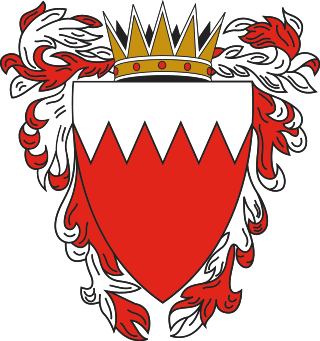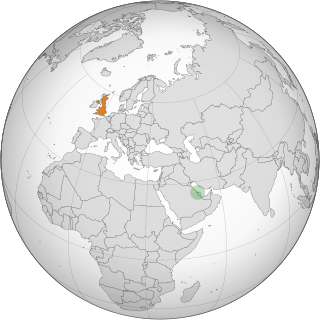Children's rights or the rights of children are a subset of human rights with particular attention to the rights of special protection and care afforded to minors. The 1989 Convention on the Rights of the Child (CRC) defines a child as "any human being below the age of eighteen years, unless under the law applicable to the child, majority is attained earlier." Children's rights includes their right to association with both parents, human identity as well as the basic needs for physical protection, food, universal state-paid education, health care, and criminal laws appropriate for the age and development of the child, equal protection of the child's civil rights, and freedom from discrimination on the basis of the child's race, gender, sexual orientation, gender identity, national origin, religion, disability, color, ethnicity, or other characteristics.

The House of Khalifa is the ruling family of the Kingdom of Bahrain. The Al Khalifas profess Sunni Islam and belong to the Anizah tribe, some members of this tribe joined the Utub alliance which migrated from Central Arabia to Kuwait, then ruled all of Qatar, more specifically Al Zubarah, which they built and ruled over before settling in Bahrain in the early 17th century. The current head of the family is Hamad bin Isa Al Khalifa, who became the Emir of Bahrain in 1999 and proclaimed himself King of Bahrain in 2002, in fact becoming a constitutional monarch.

Rahmah ibn Jabir ibn Adhbi al-Jalhami was an Arab ruler in the Persian Gulf region and was described by his contemporary, the English traveler and author, James Silk Buckingham, as "the most successful and the most generally tolerated pirate, perhaps, that ever infested any sea."

Trafficking of children is a form of human trafficking and is defined by the United Nations as the "recruitment, transportation, transfer, harboring, and/or receipt" kidnapping of a child for the purpose of slavery, forced labour, and exploitation. This definition is substantially wider than the same document's definition of "trafficking in persons". Children may also be trafficked for adoption.
Child protection refers to the safeguarding of children from violence, exploitation, abuse, and neglect. It involves identifying signs of potential harm. This includes responding to allegations or suspicions of abuse, providing support and services to protect children, and holding those who have harmed them accountable.

Sabika bint Ibrahim Al Khalifa is the first wife and consort of the king of Bahrain, Hamad bin Isa Al Khalifa. She is the mother of Crown Prince Salman bin Hamad Al Khalifa.

Bahrain's record on human rights has been described by Human Rights Watch as "dismal", and having "deteriorated sharply in the latter half of 2010". Their subsequent report in 2020 noted that the human rights situation in the country had not improved.
Child Workers in Nepal (CWIN) is a non-governmental organization working as an advocate for children's rights. CWIN supports street children, children subjected to child labour, children who are sexually exploited, and also those victimized by violence. The organization's objective is to protect the rights of children in Nepal. It was established in 1987 by a group of students at Tribhuvan University who, upon investigating the conditions of children living on the streets in Kathmandu, Nepal, recognized the need for advocacy in this area. As a "watchdog" in the field of child rights in Nepal, CWIN acts as a voice for the disadvantaged and exploited children. It does this by lobbying, campaigning, and pressuring the government to protect and promote children's rights, and to end exploitation, abuse and discrimination against children.

Sheikh Nasser bin Hamad Al Khalifa, also known as Prince Nasser, is a member of the Bahraini royal family, Commander of Bahrain's Royal Guard, deputy chairman of the Higher Committee for Energy and Natural Resources and the head of the government's Supreme Council for Youth and Sports. He is the third in line of the heir apparent of the Kingdom of Bahrain. In April 2021, he was appointed as chairman of Bapco Energies, formerly called “nogaholding".
Shaikha Hala bint D'aij Al Khalifa was the former wife of Prince Salman bin Hamad bin Isa Al Khalifa, the Crown Prince, Deputy Supreme Commander and First Deputy Prime Minister, until 2005. Hala was the youngest daughter of D'aij bin Khalifa Al Khalifa, the Assistant Under-Secretary of the Ministry of Finance & National Economy. She was the Honorary President of the Information Centre for Women & Children, and Chair of the Bahrain Society for Mental Retardation.
Shaikh Isa Bin Tarif Al Bin Ali was chief of Al-Bida, known today as Doha, the capital of Qatar, as well as the chief of the Al Bin Ali tribe from the beginning of the 19th century until his death in 1847. He was described by the political agents in the Persian Gulf as being one of the most energetic and powerful chiefs in the Gulf region
UNICEF, originally called the United Nations International Children's Emergency Fund in full, now officially United Nations Children's Fund, is an agency of the United Nations responsible for providing humanitarian and developmental aid to children worldwide. The agency is among the most widespread and recognizable social welfare organizations in the world, with a presence in 192 countries and territories. UNICEF's activities include providing immunizations and disease prevention, administering treatment for children and mothers with HIV, enhancing childhood and maternal nutrition, improving sanitation, promoting education, and providing emergency relief in response to disasters.
Life skills are abilities for adaptive and positive behavior that enable humans to deal effectively with the demands and challenges of life. This concept is also termed as psychosocial competency. The subject varies greatly depending on social norms and community expectations but skills that function for well-being and aid individuals to develop into active and productive members of their communities are considered as life skills.

Bilateral relations exist between Kingdom of Bahrain and the United Kingdom of Great Britain and Northern Ireland. Bahrain has an embassy in London and the United Kingdom is one of only four European countries to maintain an embassy in Manama. Bahrain gained independence from the United Kingdom in 1971 and has since maintained strong diplomatic, military and trade relations.

JAAGO Foundation is a non-profit organisation based in Bangladesh dedicated to providing quality education and social development opportunities to underprivileged children and communities. Established in April 2007 by Korvi Rakshand, the foundation has become a leading force in addressing issues related to education, poverty alleviation, and youth empowerment in the country.
The administrative reforms of the 1920s were a series of British-led reforms that have laid the foundations of modern Bahrain. They took place between 1919 and 1927, but their background extends to the early 19th century. Britain signed a number of treaties with Bahrain in 1820, 1861, 1880 and 1892. The latter two had effectively turned Bahrain into a British Protectorate. Earlier in 1869, Britain had appointed the young Shaikh Isa ibn Ali Al Khalifa as ruler. Shaikh Isa was an autocrat and a feudal overlord whose authority was shared with his family and Sunni tribal allies. The economy was dependent on pearl diving and palm farming. Both sectors suffered from great inequalities; the conditions of the mostly Baharnah (Shia) peasants and the mostly non-Bahraini divers were often compared to slaves. Since the beginning of the 20th century, the British influence in Bahrain has been on the rise; in 1904-5 they extended their jurisdiction over all foreigners and in 1913 issued an Order in Council, which effectively turned Bahrain into a colony. The Order was not implemented until after the end of World War I.
According to UNICEF, New Zealand has one of the worst rates of child abuse in the developed world. The level of abuse is the fifth-highest in the OECD, with an average of one child being killed every five weeks and 150,000 cases reported every year by Oranga Tamariki, the national children's protection agency. Child abuse in New Zealand is defined under section 2 of the Oranga Tamariki Act 1989 as the harming of a child by physically, emotionally or sexually ill treating them through abuse or neglect. Prevention of such abuse in New Zealand is seen as a high priority by the New Zealand government as well as relevant non governmental organisations due to the prevalence of child abuse cases occurring in New Zealand, particularly when compared with other developed countries. This response is consistent with New Zealand's obligations under the United Nations Convention on the Rights of the Child at article 34 – 35 which deals specifically with Child Abuse. This convention places obligations on New Zealand as a state to protect the rights of the child and was ratified by New Zealand in 1993.

Armenia was admitted into the United Nations on 2 March 1992, following its independence from the Soviet Union. In December 1992, the UN opened its first office in Yerevan. Since then, Armenia has signed and ratified several international treaties. There are 20 specialized agencies, programs, and funds operating in the country under the supervision of the UN Resident Coordinator. Armenia strengthened its relations with the UN by cooperating with various UN agencies and bodies such as the International Monetary Fund, the World Bank, the World Food Programme, and with the financial institutions of the UN. Armenia is a candidate to preside as a non-permanent member of the UN Security Council in 2031.
Protection of children’s rights is guaranteed by the Constitution of the Republic of Azerbaijan and a number of other laws. Children’s rights embrace legal, social and other issues concerning children.
Shaikh Abdullah bin Rashid Al Khalifa is the Bahraini ambassador to the United States.








